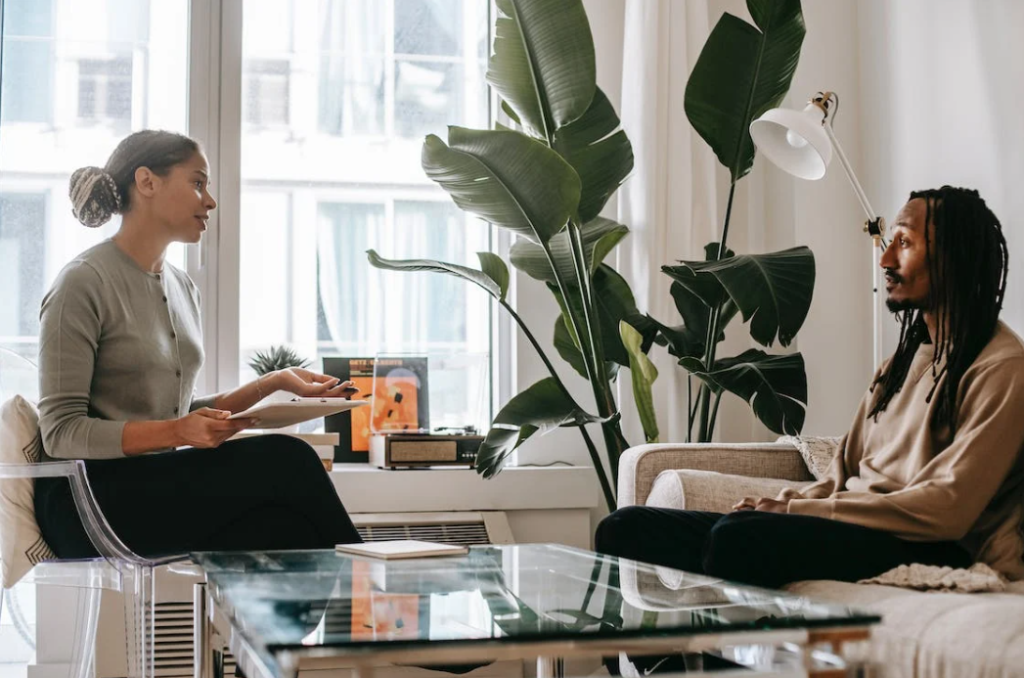Mental Health Without Medication
Learn about mental health without medication and how to implement it in yourself

Selfpause Affirmation App
Download the app to get 1,000’s of affirmation meditations and everything you need to write, record and listen to your own.
There are a number of drug-free approaches to depression and mental health. Although they do not replace the specific treatment regimens of psychiatrists, these methods enhance mental well-being. Depression is a diagnosable mental disorder characterized by a depressed mood lasting two weeks or longer, a lack of interest in daily activities, and a negative outlook on life. According to the National Survey on Drug Use and Health (NSDUH), 7.1% of American adults experience at least one major depressive episode.
Treatment of depression without medication

Psychotherapy is a great alternative to prescription medication in the treatment of depression. The process of psychotherapy helps patients focus on the positive aspects of life. It can also help people who suffer from anxiety. Psychotherapists are trained to help patients overcome their depression without using drugs. They can offer a wide range of therapies to their patients, including psychotherapy, cognitive behavioral therapy (CBT), and psychodynamic therapy.
The key is to find a treatment that works for you. It may take several sessions to get the desired results, but it will be worth the effort. The goal is to find a way to get back to the best version of yourself. Then you can move on to the next stage of your recovery.
Another effective way of treating depression without medication is to engage in physical activity. Exercise is good for your overall health, and it helps release endorphins in your brain. Endorphins are natural chemicals that relieve stress. Likewise, a healthy diet can help combat the symptoms of depression. You need to get enough magnesium in your diet, because it helps the body release endorphins. It is also essential to get enough vitamins and minerals in your diet, as deficiency of these vitamins can cause physical and psychological stress.
Alternatives to antidepressants

Although antidepressants are often prescribed to treat mental illnesses, there are several alternative treatments for depression that can be just as effective. These treatments range from herbal supplements to psychotherapy. According to the UK-based charity Mind, one in four adults will suffer from a mental health problem at some point in their lives. And as more people face the symptoms of depression, the number of people prescribed antidepressants is on the rise.
Monoamine oxidase inhibitors (MAOIs) are a type of antidepressant that targets an enzyme that controls neurotransmitters in the brain. These medications are not suitable for everyone as they can cause adverse side effects. However, they are effective for treating mild depression and can be taken along with other medications or foods.
Despite the many negative side effects of antidepressants, there are several other treatment options for depression. Cognitive behavioral therapy is one of the most effective ways to treat depression and can be used in conjunction with antidepressants. Although antidepressants are effective for mild depression, they can exacerbate other mental health conditions and make it even more difficult to recover. In addition, people who use these drugs often become addicted to them, which can lead to worsened depression, financial difficulties, and even suicidal thoughts.
Antidepressants do not have the same side effects that alcohol and drugs do. In fact, antidepressants are considered to be safer than benzodiazepines, which are addictive. However, they can also lead to physical dependence and withdrawal symptoms.
Yoga

Yoga therapy for mental health can be a lifesaver for many people who suffer from depression. It is proven to reduce symptoms of this illness, which affects 16.1 million people in the United States. While antidepressants are the standard treatment for depression, they may not be effective for all patients. Ten to 30 percent of people who try antidepressants fail to respond and experience only mild improvements.
The prevalence of mental health problems and the limited access to pharmacological treatments has prompted interest in yoga as a potential therapy. Numerous studies have been conducted to investigate the benefits of yoga compared to psychotherapeutic and pharmacological approaches. This article looks at some of the findings.
Research has shown that yoga improves the mood of people suffering from depression and anxiety. The practice promotes physical and mental fitness. Yoga also helps people develop a greater sense of self awareness. In addition to treating mental illnesses, yoga has also been shown to improve the quality of life in people with anxiety and depression. The practice can even be beneficial for those suffering from addiction. It has been shown to boost GABA, a neurotransmitter that has been reduced in those who suffer from substance abuse.
The benefits of yoga for mental health are becoming clearer as more people are discovering its benefits. Its low cost and minimal side effects make it a popular complementary treatment option for many people. There are also several different types of yoga, making it easier for people to find the right style for them.
Researchers have studied the benefits of yoga for PTSD. One study involved 64 women with PTSD who were randomly assigned to a yoga intervention or a supportive women’s health education group. The intervention lasted one hour each week for 10 weeks. After a period of time, both groups experienced a reduction in their symptoms. The yoga group, however, experienced a larger reduction in symptoms than the other group.
Journaling

Whether you are writing your journal for personal or business use, you can create an experience that is meaningful to you. There are many styles of journal writing and techniques that will help you express your thoughts and feelings. These can be helpful tools for enhancing your mental health without the need for medications. For example, you may use your journal to write about a difficult experience.
While journaling is a relatively new practice, there has been some good research on the benefits of this activity. Studies have shown that it can reduce the severity of symptoms of depression in people with MDD, people recovering from intimate partner violence, and college students who are susceptible to depression. For these reasons, journaling is a viable option for individuals who are suffering from depression.
Journaling has been shown to help people release unwanted thoughts and reframe negative events. It can also improve emotional regulation, which can have a positive effect on mental health. Expressive journaling has been shown to decrease the symptoms of post-traumatic stress and depression. It may also help people think more clearly about their problems and focus on an action plan.
Journaling has been shown to be an effective way to reduce stress, improve memory, and organize one’s life. It can also be a very effective way to work with a therapist. As long as you have a pen and pencil, you can start journaling. Eventually, your journaling will make you more aware of yourself and your feelings, which will make it easier to make changes to your life.
Journaling is a great way to express your feelings and thoughts without having to worry about grammar or punctuation. It also allows you to express yourself in a variety of formats, including lists, images, and stories.
Dialectical behavior therapy

Dialectical behavior therapy is a cognitive behavioral therapy that addresses many of the same issues as conventional treatment does, but it does so without the use of medication. This type of therapy emphasizes problem solving and acceptance-based strategies. It uses dialectical methods to combine opposing ideas and bring about positive change in an individual’s mental state.
The practice of dialectical behavior therapy was originally developed by Marsha Linehan in the 1970s to treat borderline personality disorder, which is characterized by chronic suicidal thoughts and behaviors. She read through a number of previous studies on psychosocial treatments for depression and anxiety and assembled a package of evidence-based cognitive-behavioral interventions. These treatments focused on changing a person’s cognition and behavior, but patients often felt invalidated or depressed and dropped out of treatment.
Dialectical behavior therapy requires a significant time commitment. In addition to individual and group sessions, a patient is also required to complete homework assignments between sessions. These can be extremely challenging for some people, because they may have to explore painful feelings or traumatic experiences. The process is complex and generally cannot be accomplished on one’s own.
Dialectical behavior therapy is a form of therapy that involves the use of mindfulness to change problematic thought patterns and behaviors. While it is not a replacement for medication, this treatment can help many people improve their quality of life and reduce suicidal thoughts. The therapist will help the patient identify the root cause of their problematic thoughts and behavior, while teaching them new ways of coping with the situation.
Dialectical behavior therapy is a highly effective treatment for people with serious mental health conditions. The technique was originally designed for borderline personality disorder, but has now been adapted to treat many mental health disorders. In addition to depression and anxiety, DBT is also effective for people with eating disorders, substance abuse, and post-traumatic stress disorder.
Our Top FAQ's
There are several strategies that individuals can use to manage their mental health without medication. These may include:
- Engaging in regular physical activity and exercise, which can help to improve mood and reduce stress
- Eating a healthy diet and getting enough sleep, which can also help to support overall mental health
- Practicing mindfulness and relaxation techniques, such as deep breathing, meditation, or yoga
- Seeking support from friends, family, or a therapist or counselor
- Engaging in activities that bring joy or a sense of accomplishment, such as hobbies or volunteer work
- Seeking support from online or in-person support groups or communities
Individuals with mental health conditions can support their mental health without medication by incorporating the strategies listed above, as well as by:
- Seeking out therapy or counseling to address their mental health concerns
- Developing healthy coping mechanisms to deal with stress and difficult emotions
- Engaging in self-care practices, such as taking time to relax and recharge, setting boundaries, and prioritizing self-care activities
- Seeking support from trusted friends and family members, or seeking out additional support from support groups or communities
- Seeking out alternative treatments, such as acupuncture, herbal remedies, or nutrition therapy, with the guidance of a healthcare professional
There are potential risks and benefits to managing mental health without medication. Some potential risks may include:
- Difficulty managing symptoms or experiencing worsening of symptoms without medication
- A higher risk of developing other health problems related to untreated mental health conditions
- Difficulty finding alternative treatments that are effective for managing mental health conditions
Some potential benefits of managing mental health without medication may include:
- Avoiding the side effects of medication
- Having more control over one’s treatment and recovery process
- Reducing the risk of developing dependency on medication
- Improving overall physical health by avoiding medication-related side effects
Individuals can work with their healthcare provider to find alternative treatments for mental health conditions by:
- Discussing their concerns about medication and any potential side effects they may be experiencing
- Asking about alternative treatment options, such as therapy, counseling, or other non-pharmacological approaches
- Working with their healthcare provider to develop a treatment plan that takes into account their individual needs and preferences
- Keeping their healthcare provider informed about their progress and any changes in their symptoms or treatment preferences
There are many resources available for individuals seeking support for mental health without medication. These may include:
- Therapy or counseling services, which can be provided in-person or online
- Support groups or communities, which may be available online or in-person
- Alternative treatment options, such as acupuncture, herbal remedies, or nutrition therapy, with the guidance of a healthcare professional
- Self-care resources, such as books, podcasts, or online courses, that provide information and guidance on managing mental health without medication
- Online resources and hotlines that provide information and support for individuals seeking to manage their mental health without medication
